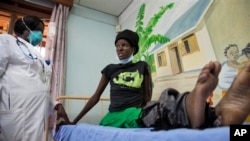Uganda should take stock of the progress it has made in creating a healthier population. According to the recently released Uganda Demographic Health Survey, there are some clear and positive trends: more women delivering babies in health facilities; substantial reductions in infant and under-five mortality rates; and an increased percentage of households with at least one insecticide-treated bed net to combat malaria.
But while these statistics are encouraging, they mask a troublesome reality: the health of most Ugandans remains poor, with children especially at risk. There are many reasons to explain this situation, but most boil down to the fact that the country’s health care system is under-resourced, poorly managed, and unable to meet the demands of a growing population.
The evidence is clear: in developing countries, a government’s investment in the health and well-being of its citizens is key to generating prosperity and progress. President Museveni pledged in the 2001 Abuja Declaration, and reaffirmed in 2013, to dedicate 15 percent of the national budget to health. Today, that number stands at just seven percent. Moreover, the Government of Uganda‘s proposed budget for the next fiscal year recommends nearly a one-third cut for the Ministry of Health, plus reductions in other health investments.
More must be done to meet the healthcare needs of Uganda’s citizens, especially its youngest and most vulnerable. There are still at least 2.4 million Ugandan children under five who are chronically malnourished. Only two-thirds of people living with HIV are receiving life-saving antiretroviral therapy, and there are 8.5 million cases of malaria annually. The proposed reductions to the country’s health budget will put these lives in greater jeopardy.
The U.S. invested nearly $500 million in the country’shealth sector last year.
The United States has done its part to help build a healthier Uganda. Last year alone, we invested nearly $500 million (more than 1 trillion Ugandan Shillings) in the country’s health sector to control the HIV/AIDS epidemic, combat tuberculosis, improve maternal and child health, and control malaria. This work is saving lives and improving the health of millions of Ugandans, and we are proud to contribute to such efforts.
The U.S. government calls upon the Government of Uganda to increase investment in the health of its people so Uganda can reach its full economic potential.














